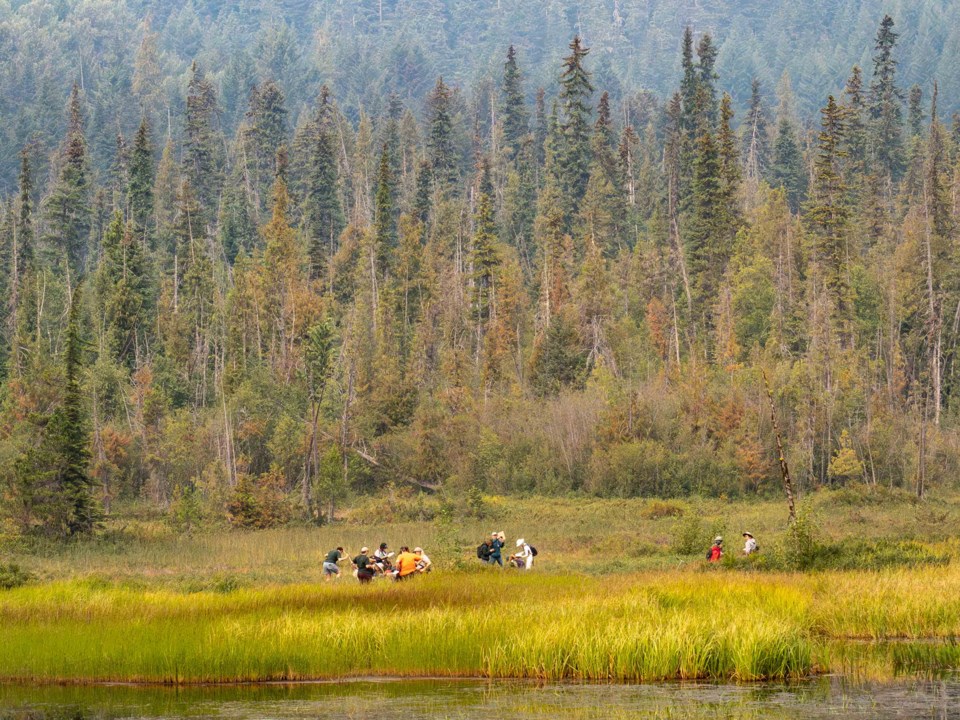Experts estimate Whistler has lost about 70 per cent of its natural wetlands to development over the decades.
That’s partly why groups like the Whistler Naturalists Society are working to protect the valuable ecosystems like marshes, bogs, ponds and swamps that still cover approximately 2.3 per cent of the municipality.
“What’s remaining is so, so precious,” said Kristina Swerhun of the Whistler Naturalists.
A group of nature enthusiasts had the opportunity to take a closer look at some of those wetlands last month—and learn how to identify them—when the Whistler Naturalists partnered with the BC Wildlife Federation (BCWF) to bring the provincial organization’s “Map our Marshes” workshop to Whistler for the first time on Aug. 19 and 20.
As BCWF’s wetlands education program coordinator Alana Higginson explained prior to the event, the program aims “to restore, enhance, and conserve wetlands across the province while creating a community of wetland stewards who can continue this work.”
Higginson led the sold-out crew of about 23 of those stewards over the two days, ranging from Lil’wat Nation and Squamish River Watershed Society representatives to locals and visitors from Vancouver looking to learn something new, but the idea to host a wetlands workshop in the Sea to Sky was all former Whistler Naturalists board member Shawn Mason’s.
Only one of those participants fell in, but “she was a good sport about it,” Mason recalled with a laugh.
“The people that came were so keen, and it was so good,” she added.
Mason, a self-proclaimed “birder by nature,” was initially drawn to attend another wetland workshop taking place elsewhere in B.C. last year. She wasn’t able to make it to that event, but forged a connection with BCWF staff who agreed Whistler would be an ideal workshop location. While Mason handled organizing duties, Whistler Naturalists co-presidents Swerhun and Bob Brett helped nail down a location.
The workshop began with a classroom session at the Whistler Public Library—including a bonus presentation from local biologist Brett about beavers’ role in forming and maintaining wetlands—before participants ventured out to the Emerald Forest, to a wildlife refuge behind Whistler Cay, the following day. There, the group witnessed the result of all that beaver activity for themselves, and learned more about the various plant species that live in Whistler’s wetlands, before venturing closer to Rainbow, near the shores of Green Lake.
Usually, BCWF workshop leaders “like to go to two to three different sites to compare wetlands,” said Swerhun. “But this one was so big, we could go to those two sites in the same wetland.
“One was a lot more grassy, so people learned about that, and then in the other section, there’s way less nutrients, and we have those sundews, which are carnivorous plants—so that was very cool.”
Typically the program would cost each participant about $100. This time around, BCWF was able to offer the workshop for free thanks to successful grant applications, said Mason.
Though last month’s workshop was focused less on fact-finding and data collection and more on education and “building up a group that cares about wetlands,” Swerhun said she hopes the focus on wetlands will translate to formal protections in a habitat protection strategy in the works at municipal hall.
In the meantime, the Whistler Naturalists will “keep pushing for wildlife protection, and defining what that protection means,” said Swerhun.
Bogs, swamps and marshes aren’t the eerie places fairytales so often made these ecosystems out to be, as wetlands education program coordinator Higginson noted during the workshop.
The BCWF events are succeeding in “getting rid of the myth and celebrating everything that wetlands do for us,” said Swerhun.
“We take it for granted that our rivers will always be full, but wetlands are the sponge that holds water when it’s wet and releases it when it’s dry … the more we destroy our wetlands, there is no more sponge holding the water when things get dry,” she explained.
Head to whistlernaturalists.ca for more information, and mark your calendars for the organization’s next event: the beloved annual Fungus Among Us Festival returns to Whistler on Oct. 13 and 14.




